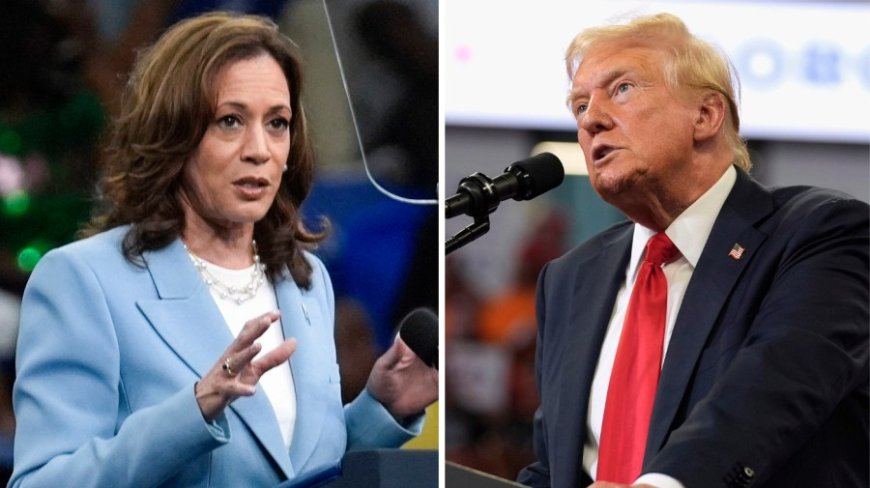How elections can create financial crises
The evidence of how feel-good economic stimulants can backfire over time is there for everyone to see.

If you were looking for some fiscal rationality in the 2024 presidential election, you should be greatly disappointed.
The opacity of financial matters makes it a most convenient subject for the creation of fanciful alternative universes that candidates can ride into office. Both Vice President Kamala Harris and former President Donald Trump are taking full advantage of that fact.
Random populist giveaways such as grocery price controls, credit card rate caps, subsidies to stimulate housing and small businesses, U.S.-sponsored cryptocurrencies, rent control caps and increased trade tariffs are easy to promise when the beneficiaries are cheering wildly. After all, they always presume that someone else’s pocket is being picked — that it won’t affect them.
Luckily, many such “get-me-elected” promises never come to pass, since they require the acquiescence of what is now a deeply dysfunctional Congress. Even economists, who have an abysmal record of prediction and a near perfect record of analyzing disasters after the fact, seem to agree that the current grab-bag of financial goodies being dangled before us is a bad idea.
When governments attempt to manipulate free markets with policies geared toward social goals, businesses are forced to make decisions based on non-economic factors. That usually triggers a domino-like chain reaction that distorts markets and results in operating aberrations, which lead to financial distress.
In 1832, as westward expansion was exploding, President Andrew Jackson terminated the central banking system in the U.S. — the Bank of the United States — largely for political reasons. Its liquidity was redistributed from East Coast banks to his newly chartered and poorly regulated state-chartered “pet banks”. In 1836, he required federal land to be purchased with gold or silver, almost single handedly destabilizing markets and facilitating the Panic of 1837.
In the early 20th century, President Teddy Roosevelt signed legislation that capped railroad rates as the government pursued a populist anti-business agenda replete with investigations and headline-grabbing charges against businesses. Coupled with a lack of regulation of the new, high-wire trust companies emerging at the time, this contributed to the Panic of 1907, which paralyzed the country and overwhelmed the government. It took a forceful banker, J.P. Morgan, to re–reestablish the stability and confidence that the government couldn’t.
In the 1920s, the Federal Reserve rejected calls to raise interest rates to cool a speculative, out-of-control stock market, for fear of harming European economies. That helped fan the flames of speculation for a few more years and led to the Great Depression of 1929. The subsequent passage of the Smoot-Hawley Act increased tariffs on foreign imports to the U.S. by about 20 percent, further wounding the U.S. economy. The stock market would not return to its pre-depression levels until 1954.
In 1966, President Lyndon Johnson signed legislation imposing federal interest rate caps on deposits at savings and loan associations, the main home lenders in America at the time. Meanwhile, most states enacted usury laws limiting the interest that could be charged on home mortgages. These two popular actions created a deadly subsidy for home-buyers at the expense of savers. When interest rates skyrocketed to 21 percent in 1982, the strategy backfired, causing the savings and loan industry to collapse.
Finally, in the 1990s and early 2000s, the Clinton and Bush administrations sought to increase the number of middle- and low-income homebuyers by (among other things) lowering underwriting standards. Those well-intentioned actions led to a very unfortunate series of economic events.
Subprime lending became a tool to fulfill the promise of increased home ownership, and it was easy to jump on that bandwagon. Everyone from mortgage brokers to carpet installers benefited from 2.5 percent more homes being built. Unfortunately, the government failed to appreciate how the risk created by such poorly underwritten loans was being spread around throughout the economy.
Fannie Mae, Freddie Mac and Wall Street packaged those substandard mortgage loans into mortgage-backed securities, allowing almost every intermediary in the mortgage loan assembly line to make money while assuming little risk to no risk. The risk fell on the ultimate MBS investor, whose investment shriveled when borrowers who were never going to be able to pay their mortgages eventually just didn’t.
The evidence of how such feel-good economic stimulants can backfire over time is there in the historical record for everyone to see. Interest rate caps don’t make credit cheaper; they reduce credit availability for the people who need it the most. Tariffs don’t automatically balance trade without affecting a range of other pricing and economic variables, which can end up raising prices.
The populist mantra — that the more homeowners there are, the better the country is — has been responsible for much of the economic carnage of the last century, often encouraging people who should be renters to become defaulting homeowners instead. Similarly, when rent caps artificially lower rents, they shrink availability and create even greater housing shortages and higher rents as landlords flee an unprofitable business model.
We should have learned these lessons in 1929, the 1980s and 2008. But politics tends to ignore history and instead pander to the present. Moreover, governments never admit that it was their policies that caused inflationary prices, unemployment and business bankruptcies. It is much easier to pin the tail on some evil corporate donkey and turn the economy into a game of musical chairs, to see who can get the most out of it. Someone should explain that economies flourish based on what we put into them rather than what we take out of them.
Political promises that rely on voodoo economics and irrational financial principles are so ubiquitous this election cycle because the candidates must overcompensate after our leaders have so thoroughly abused the economy over the last several decades. It makes our job as voters a tough one: We have to determine who offers the least irrational list of economic giveaways.
Good luck.
Thomas P. Vartanian is a former U.S. bank regulator and author of “200 Years of American Financial Panics.”
What's Your Reaction?





















































